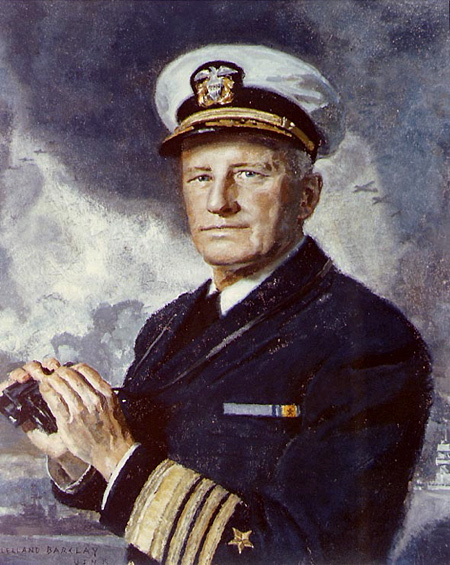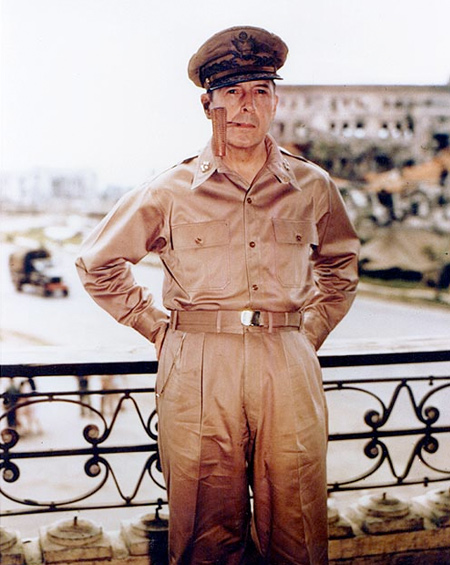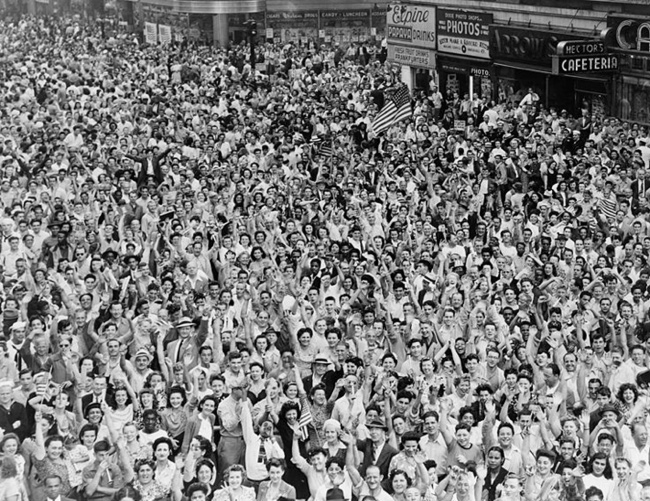 Source: Photo 80-G-K-13826, Navy History & Heritage Command
Source: Photo 80-G-K-13826, Navy History & Heritage Command
Admiral Chester Nimitz
Following the Japanese attack, President Roosevelt appointed Admiral Chester Nimitz as Commander-in-Chief of the Pacific Fleet at Pearl Harbor. Admiral Nimitz quickly restored morale and developed a plan to counter the Japanese. Later in 1944, Nimitz received a fifth star and was promoted to Fleet Commander, a position established primarily in wartime. He now commanded all allied naval forces in the Pacific and led the amphibious drive toward Japan.
 Source: Photo 80-G-K-13826, Navy History & Heritage Command
Source: Photo 80-G-K-13826, Navy History & Heritage Command
General Douglas A. MacArthur
President Roosevelt ordered General MacArthur to leave the Philippines in 1942. General MacArthur's new mission was to lead the "island hopping" campaign in the Southern Pacific. The Allies knew that they could not afford the manpower to retake every single island in the Pacific. However, if they just recaptured the most valuable or strategic islands, thus hopping over the less important ones, those remaining under Japanese control would simply be cut off from their supply lines.
 Source: General of the Army Douglas USA C-2413, Navy History & Heritage Command
Source: General of the Army Douglas USA C-2413, Navy History & Heritage Command
Bombing of Japan
As the allies drove closer to Japan, they were able to wage a bombing campaign on the chain of islands. Unlike the bombing conducted on Germany, allied forces dropped incendiary (fire) bombs on major cities in addition to strategic military and industrial sites. In fact, many cities were in ruins by the time the United States decided to drop the atomic bomb.
![]() Click on the mushroom cloud below.
Click on the mushroom cloud below.
Despite the destruction of Japan's major cities, the Japanese refused to surrender. Back in Washington DC, President Roosevelt died, and it was now up to President Harry S. Truman to give the next order. On August 6, 1945, he ordered the United States to drop an atomic bomb on Hiroshima, Japan.
Its impact was immediate and decisive. Between 90,000-166,000 people died within 4 months and about one half of those fatalities occurred within the first day. Still the Japanese would not surrender. Not until the United States dropped a second atomic bomb on the city of Nagasaki on August 9, 1945, did the Japanese surrender. It is certain that a full invasion of Japan without using the atomic bombs would have cost a lot of American lives.
Recall that the Soviet Union had agreed to wage war against Japan 3 months after the war ended in Europe. So about when did they begin fighting the Japanese? Do you think they made a significant contribution on behalf of the allies? The stage is being set for the relationship between the United States and the Soviet Union following World War II.
V - J Day
On September 2nd, 1945, on board the battleship MISSOURI in Tokyo Bay. Fleet Admiral Nimitz accepted Japan's official surrender on behalf of the United States. News of the event spread worldwide and many jubilant Americas showed their joy. Unlike the celebration following Germany's surrender, this victory meant World War II was over.
 Source: VJ Day, Times Square, Wikimedia.
Source: VJ Day, Times Square, Wikimedia.